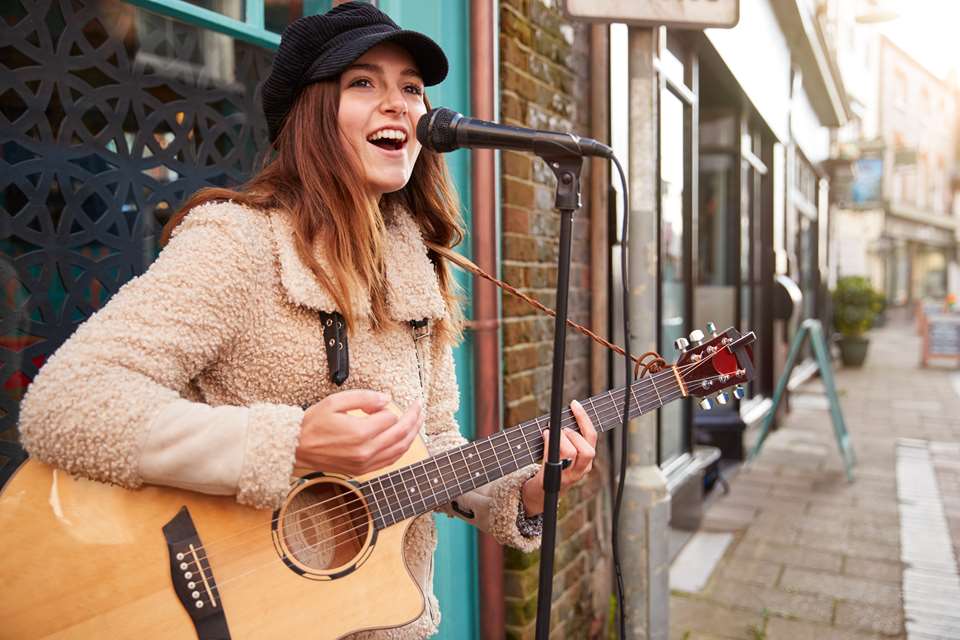London Youth Choirs: Ten years and counting
Phil Croydon
Wednesday, February 1, 2023
Ahead of London Youth Choir's 1oth anniversary gala concert, MT's Phil Croydon meets Rachel Staunton, LYC co-founder and artistic director and 2023 Music & Drama Education Award nominee, to discuss the organisation's beginnings, journey and mission for London.

Courtesy ITV
LYC at the Royal Variety Performance 2022, with Andrew Lloyd Webber and Gary Barlow, conducted by honorary patron Gareth Malone
Like many enduring organisations, the London Youth Choirs (LYC) owes much to timing, demand and a small group of well-motivated individuals. In Staunton's case, the idea for a choir came while spectating at the 2012 London Olympics, watching handball. ‘I was thinking how I love London at this time,’ she recalls, ‘because everyone was chatting on the tube and it felt different. Sport had really brought people together.’
Drawing-board stage
At around this time, Staunton was getting to know Suzie Digby OBE, a trailblazer for singing and the Voices Foundation. She too saw the galvanising effect sport was having on young people of every background. In another part of London, Digby's friend David Symondson, a financier, was having thoughts about connecting young people after staring at a hospital wall on which ‘hello’ was painted in 50 languages. ‘We had this dangerous coffee in Covent Garden,’ Staunton recalls, ‘where we decided just to crack on with the idea.’ Symondson was to provide the seed funding, while Staunton and Digby developed the musical model. The three could have spent a year planning and raising money, but September seemed as good as time as any with the start of the academic year. Symondson funded 150 auditions and Staunton enlisted venues across London, including The Wigmore Hall, when searching for singers.
The auditions would lead to a boys’ choir, girls’ choir, training choir, youth choir and chamber choir, with 115 members in total. ‘We started with five choirs and at the time that seemed a little bonkers’, admitted Staunton. They could have focussed on one choir, making this really strong, or gathered up children who already had singing lessons. ‘But we chose the harder path’, she says, in order to cater for novices and provide progression for young singers to develop and progress. Five stages would provide the necessary broad base for a pyramid. Rehearsals eventually began at St Saviour's, Pimlico, and Pimlico Academy.
A shared love for music
Around the time of the Olympics, the system of music hubs in London was still bedding in, and provision for young singers was patchy. There were excellent providers of music education at borough level, including for orchestral players and jazz, but little city-wide provision for committed singers. The hubs, drawing from borough catchment areas, could also be limited if looking to further social cohesion across the city.
When starting, Staunton's previous experience proved useful: ‘I was drawing from having grown up in the Berkshire Youth Choir, from where I'd developed friends from all across the county. Many went to different schools to me, but we all shared a love for music and were driven, entering competitions such as Sainsbury's Choir of the Year. When I moved to London, I was surprised there wasn't something similar, so I started a few choirs.’
This included a choir at London's Foundling Museum, which had a ‘heart’ not unlike that of the new LYC. Staunton had a strong sense that there should be opportunities for children from all backgrounds to sing together, especially since singing was free (minus the cost of instruments).
London calling
In 2013, LYC received funding from Youth Music for its first major schools workshop project (a ‘workshops tour’), reaching 66 state primary and secondary schools across all London boroughs. Youth Music responded positively to Stainton's bid, she thinks, because of the obvious lack of a London choir and the deteriorating state of singing in schools. As mad as a workshop-tour felt, she says, it enabled LYC to measure demand and connect with music hubs and build future partnerships. In the end, Staunton and her colleagues did 72 workshops, because ‘there was more aptitude than we had money for’.
Having ‘London’ in its title was also eye-catching to potential venues, artistic partners and paying customers. And Staunton soon realised the power of social media: ‘Even before LYC had sung a note, I'd set up Twitter accounts and would go to meetings where people had heard of London Youth Choirs, because they had seen it on social media.’
 © Ben Tomlin
© Ben Tomlin
Rachel Staunton, artistic director and co-founder of LYC
One of LYC's early projects involved Camden music service and the Orchestra of the Age of Enlightenment, with which LYC made its orchestral debut at Brighton's Early Music Festival (2013). The early diary also shows appearances at the O2 Arena and Hyde Park with the Rolling Stones, as part of the Stones’ ‘50 & Counting’ tour. Five years later, a performance of Mahler 2 at the Royal Festival Hall with the London Philharmonic Orchestra and Chorus marked another London milestone.
How it works
Design and pathways
In January 2023, LYC became a family of ten choirs for young people from school Year 3 to age 23, serving different age groups, voices and abilities. Choirs meet once a week during term time, and fall into the category of ‘central’ or ‘regional’ depending on where in London they rehearse, where demand was, and their position within the pyramid.
Six ‘central’ choirs draw on singers from across the capital. There are two junior choirs (boys and girls) serving school Years 3–6; two specialist cambiata choirs (boys and girls) for school Years 7–11, accommodating the ‘changing voice’; and two senior mixed-voice choirs: the London Youth Choir (Years 11–23) and the LYC Chamber Choir (ages 16–23). Typically, singers remain at each level for two or three years before moving up.
The ‘regional’ mixed-voice junior choirs (for Years 3–6) of LYC South East (based in Southwark) and LYC West (Ealing) are supplemented in 2023 by LYC South West (Streatham) and LYC North East (Tottenham). This expansion, inspired by LYC's 2022 Aspire campaign targeting areas with high social deprivation, speaks to LYC's continuing city-wide mission. It's created six junior choirs (for ages 7–11) in total, providing an important pipeline and making ‘the bottom of the pyramid as broad and accessible as possible,’ Staunton explains, ‘getting more young people involved earlier on.’ Keeping things local also mitigated the cost of travel, a financial barrier.
Access and progression
Entry to the junior choirs is by audition, but not in a scary sense. Candidates have nothing to prepare, and take part in small-group workshops, learning simple songs, having fun and getting a taste of what rehearsals are like. Singers sign up for auditions on the LYC website, then experience in-person or online auditions. Crucially, the cost to audition is free, underscoring LYC's belief that finance should be no barrier. For those auditioning or thinking of joining, there are also reassuring videos online of what to expect.
The next step is the London Youth Choir, for Year 11 singers to those aged 23. This explores wide-ranging repertoire encompassing many styles and languages, and members receive separate musicianship classes to improve score-reading and ensemble skills. Singers have solo auditions, and individuality is encouraged.
The 24-voice LYC Chamber Choir, for ages 16–23, represents the pinnacle and culmination of LYC's training. It features London's finest choral singers, capable of tackling the most challenging works, and provides opportunities for professional music-making. This gateway is significant. ‘A lot of young people can't see themselves in the wider choral profession,’ admits Staunton, ‘and if you look at the professional choirs, the majority of them look a certain way and the pathways are fairly predictable. How do we change the look of the BBC Singers or the major choral societies and symphonic choruses?’
LYC signposts opportunities for members to continue their journey beyond LYC, preparing them for auditions for the National Youth Choirs of Great Britain, university scholarships or conservatoire training.
Outreach
It's well documented that singing in UK schools, particularly primary, saw a dramatic decline over the last decades. Initiatives such as Sing Up! have done much to address this. LYC's campaign Aspire, launched in 2017, has provided bespoke singing experiences within schools in areas of high deprivation, and equipped teachers with CPD training so that they have confidence to make music a feature of school life again. This training has helped deliver Singing Assemblies, which give children an opportunity to discover their voice and experience singing alongside their peers. LYC also works with London's music hubs to raise awareness of musical opportunities (including membership of LYC) and holds popular family ‘Come & Sing’ days across London during school holidays.
The business end
LYC's founding donors were David and Fiona Symondson and the Vernon Ellis Foundation. Over the last 10 years LYC has developed a mixed portfolio of supporters, of mostly trusts and foundations but also significant corporate sponsors, namely China Construction Bank and Convex Insurance. Strategically, this diversity was necessary as public funding moved away from the capital and towards the regions, and following the financial pinch we were all experiencing. Looking at LYC today, the impression is of a growing organisation in capable hands, not short of expertise. ‘I think we all need that drive,’ says Staunton, ‘but definitely it's a team effort. I often feel I get to take a bow for LYC, but without people like Nina Camilleri on the business end, we would be nothing and wouldn't have survived the pandemic.’
 © BELINDA LAWLEY
© BELINDA LAWLEY
LYC during rehearsals
Repertoire
LYC strives to represent the widest-possible representation of choral music, offering the chance to sing in many genres and languages. This includes works by under-represented groups including women composers and the Global Majority – addressing obvious historical imbalances is part of the course. ‘I realised’, admits Staunton, ‘that I'd got through a music degree and a masters without having performed a single piece by a woman. Moreover, slightly worryingly, I hadn't actually noticed this at the time. I feel I owe it to young people to do better.’
LYC's musical diet includes composers that look different to each other, but also not so different from LYC members: ‘We include different compositional voices because young people thrive on being able to see and hear role models that are like them. It's about opening kids’ ears and eyes to different experiences.’
LYC hasn't commissioned many works, but when it does, it involves collaboration of some form. For their 10th anniversary, LYC was able to commission new pieces thanks to a generous donation from an alumni family. The brief to composers followed a familiar pattern in that the young singers were to be part of the creative process, whether through workshops, helping with lyrics or even contributing musically. LYC members have a stake in, and commitment to, these works. The other benefit is that they see first-hand a composer at work, what being a composer means and, hopefully, further role models. For the Gala Concert in May, there are two commissioned pieces – by Brenda Rattray and Amy Bryce – that live up to these ideals. Without giving too much away, I think the audience will be moved by LYC's level of engagement.
 © JOHN SIBLEY
© JOHN SIBLEY
LYC at Wembley Stadium
Access and belonging
LYC prides itself on creating a welcoming environment for all to thrive, feel safe and included. The journey starts by mitigating as many obstacles as possible. ‘This is much more than a gesture’, explains Staunton; ‘a major barrier is cost, so all our members at the moment are subsidised to the tune of 70 per cent.’
Then there are singers who receive free places, from families with a joint income of less than £40,000 a year. Some require additional support, which might include owning an LYC Oyster card, which covers public transport to and from choir, or help with uniform costs, such as black shoes for concerts: ‘We were having a chase around Marks & Spencers the other day’, says Staunton.
There's further support during the weekly rehearsals. For sustenance and energy levels, LYC has help from the Felix Project, London, which collects and distributes fresh, nutritious food that can't be sold. And LYC's head of Safeguarding and Pastoral Care, Allison Barstable, lays on one-to-one catch-ups for singers that feel like talking to someone.
Post COVID, it's been a challenge keeping LYC at full strength. Members from more deprived areas of the city have dropped out because of digital deprivation or changed circumstances. Remarkably, LYC ended the COVID period with more members than when it started; but there's little room for complacency: ‘We’re obsessed by who the members are and we want to make sure that all are told about this opportunity and are getting the access’, explains Staunton; ‘but we've still a long way to go.’
The pandemic and new ways of working
When discussing choirs, it's hard to ignore the impact of COVID-19. With the restrictions on singing, many choirs faced an uncertain future. LYC were quick to adapt, and within weeks of the first lockdown, all rehearsals moved to Zoom. ‘It was quite full-on because we had eight choirs at that point, and 72 weeks of online choir’, Staunton adds casually. Initially, online meetings involved guest slots, featuring Voces8, The Swingle Singers and guest conductors, but then LYC members were asked what they wanted most from the sessions. Perhaps unsurprisingly, they voted to have their usual conductors and routine back, and this was granted. LYC's youth voice was listened to, which is typical. As part of the 10th anniversary plans, LYC has created a Youth Advisory Panel offering eight senior members the chance to represent members at board level.
Back online, LYC moved to learning pieces and, where possible, virtual recordings, but without any additional stress. Fun musicianship activities became the norm, says Staunton, and it proved helpful having a screen on which to demonstrate music-reading points, share YouTube clips and listen as a group, exploring the wider benefits of hybrid learning.
In 2020, LYC presented ‘Together’, its first-ever fully digital concert, featuring pre-recorded performances by every LYC choir. Since the relaxing of COVID restrictions, Zoom rehearsals have continued, largely as useful time- or travel-savers, and there are plenty of auditions online.
A place to sing, a space to grow
I ask Staunton if she can list her musical LYC highlights from the last 10 years. There are too many to mention, she says, but these include performances at the Royal Variety Show, Glastonbury festival, and outside Buckingham Palace for the Queen's Platinum Jubilee celebrations. A further highpoint was a recent concert at Shoreditch Town Hall, where several boys took solos, acted and stole the show. I question whether the boys ever worry about what's ‘cool’ (based on my own limited experience) – ‘no, we all just get on with it’, she says.
For Staunton, seeing the first singers who joined LYC progress all the way to the Chamber Choir is as memorable as any musical highlight; it proves the pathway she envisaged is possible and that young people – with support – stay the course. Other personal highlights have included watching children who are in foster care come to something they feel is their friendship group, or children with special educational needs managing to perform on stage at the Royal Albert Hall and getting a huge kick out of the experience. ‘These things definitely drive me on,’ Staunton says, ‘perhaps even more than the music. Music is the vessel, and I'm always going to love music. But this social-change thing is probably the bug I've got.’
The final word should go to an LYC member: ‘LYC really raised my confidence socially, individually and as a performer. It has given me the courage and self-assurance to enjoy singing on stage again. This has allowed me to be a more authentic version of myself and has given me a community and friendships in which I feel celebrated.’
The gala concert on 9 May at the Royal Albert Hall will feature all 10 choirs, 500 LYC singers. In addition there will be a thousand guest singers drawn from schools in LYC's partnership areas of London.










